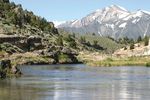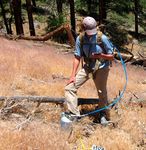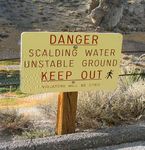Hot Water in the Long Valley Caldera-The Benefits and Hazards of this Large Natural Resource
←
→
Page content transcription
If your browser does not render page correctly, please read the page content below
Hot Water in the Long Valley Caldera—The Benefits and
Hazards of this Large Natural Resource
(44-16, see map on page 2) drilled near
The volcanic processes that have shaped the Long Valley Caldera in eastern California the Inyo Craters chain encountered water
have also created an abundant supply of natural hot water. This natural resource provides at temperatures near 428° F (220° C).
benefits to many users, including power generation at the Casa Diablo Geothermal Plant, The heated water is naturally buoyant
warm water for a state fish hatchery, and beautiful scenic areas such as Hot Creek and rises from depth, but before it can
gorge for visitors. However, some features can be dangerous because of sudden and
reach the surface, it encounters highly
unpredictable changes in the location and flow rate of boiling water. The U.S. Geological
Survey monitors several aspects of the hydrothermal system in the Long Valley Caldera permeable rock layers that channel the
including temperature, flow rate, and water chemistry. flow eastward. Along the way, the eleva-
tion of the land surface and thus the
pressure on the water drops, allowing
the water to boil. Some steam and gas
The Long Valley Caldera is a large, years have also created the visually reaches the land surface in the vicinity of
oval-shaped depression formed 767,000 impressive Inyo Craters chain that trends Shady Rest Park, at the east edge of the
years ago during a massive volcanic north from the town of Mammoth Lakes. town of Mammoth Lakes. Steam upflow
eruption. The caldera stretches north- has created approximately 12 acres
eastward from Mammoth Mountain to The Hydrothermal System in Long (nearly 50,000 square meters) of thermal
Glass Mountain, a distance of nearly ground near the park, where trees and
20 miles (32 kilometers). A central Valley Caldera other vegetation have died.
highland known as the resurgent dome In any volcanic system, only a part Before geothermal power production
and numerous smaller hills within the of the magma (molten rock) erupts at began, the hot water discharged from hot
caldera reflect subsequent volcanic the land surface. What remains under- springs at Casa Diablo, but these have
activity; for example, Doe Ridge near ground slowly solidifies and loses heat turned to steaming gas vents (fumaroles)
the Mammoth Yosemite Airport, is built to surrounding rocks. At Long Valley, as the water level has been drawn down.
from lava erupted 300,000 years ago. snowmelt on the western caldera rim A small amount of hot water warms the
The Hot Creek Geologic Site, a U.S. infiltrates deep underground and absorbs spring-fed ponds at the Hot Creek State
Forest Service managed recreation area, a large amount of heat and gases (like
is located at the north end of Doe Ridge. carbon dioxide) released from the
Volcanic eruptions in the past 10,000 residual magma. A 1-mile-deep well
The boiling springs in Hot Creek are scenic but can erupt unpredictably.
Because of this danger, the U.S. Forest Service closed parts of the area
to visitors. Photograph courtesy of U.S. Forest Service.
U.S. Department of the Interior Fact Sheet 2018–3009
U.S. Geological Survey March 2018Fish Hatchery. However, the main point 119° 118° 45’
of discharge is the Hot Creek Geologic
Site, where Hot Creek has cut a gorge 395
Map
CA
that intersects the underground hot water Area
LI
flowpath. The hot springs in the gorge
FO
Inyo
Glass
RN
Mountain
discharge a total of 64 gallons (242 liters) LONG V
ALLEY CALDERA A
I
craters
of water per second—enough to fill eight 37° 45’
Owens River
Olympic-size swimming pools each day.
and domes
Hot water that does not discharge in
Hot Creek gorge comes out at a number
of hot and warm springs as far east as Well 44-16
ek
Hot Creek
the shores of Crowley Lake. This large
re
Resurgent Dome Geologic
tC
Site
Ho
volume of hot water distinguishes Long
Casa Diablo
Valley Caldera from most other volca- Shady Rest Park Geothermal Well CH-10B
Plant
nic systems, where hot springs may be 203
Mammoth Doe
common but release much less water. Mammoth Lakes
Mammoth Creek Hot Creek State
Ridge
Mountain
37° 37’ 30” Fish Hatchery Mammoth
Benefits of Natural Hot Water
Yosemite
airport
Crowley
Lake
The geothermal plant at Casa Diablo Owens River
0 5 MILES
operates production wells that bring
the hot water to the surface, where the 0 5 KILOMETERS
395
heat is used to generate electricity. The
cooled water is then injected back into Simplified geologic map (top) and cross section (bottom) of Long Valley Caldera. The
the ground. The success of this operation, resurgent dome, Doe Ridge, and the Inyo craters and domes all reflect volcanic activity
which began in 1985, has led to expan- since 767,000 years ago, when a giant eruption formed the caldera. The hot springs in
sion of the plant’s power production Hot Creek are fed by Sierra Nevada snowmelt that seeps underground, is heated to at
capabilities to the present net capacity least 428° F (220° C) in the vicinity of molten rock (magma), and flows eastward beneath
of about 30 megawatts, enough to power the ground (red arrows). The temperature of the water reaching the springs at Hot Creek
22,000 homes. Increased production could be affected by earthquake activity, geothermal heat extraction, mixing with
from new wells near Shady Rest Park is cooler water, and other factors.
expected to substantially boost generating
capacity. WEST EAST
The Hot Creek State Fish Hatchery
relies on the naturally heated water to LONG VALLEY CALDERA
maintain fish growth rates throughout the
winter months, when low air tempera-
SIERRA
tures would otherwise make the ponds NEVADA Inyo
too cold. The trout from these geother- craters
and Casa Diablo Glass
Mammoth
mally heated ponds are then released to domes Lakes Geothermal Mountain
Plant
local lakes and streams, including Hot Cold
Resurgent
Hot Creek
gorge
Creek, where they provide recreational Water Well 44-16 Dome
enjoyment for fishing enthusiasts. Hot Water Well CH-10B
The Hot Creek Geologic Site, 428ºF
(220ºC)
338ºF 199ºF
(93ºC)
(170ºC)
managed by the U.S. Forest Service, is a
Caldera fill deposits
scenic stop for visitors to see the boiling 2
Depth, in kilometers
hot springs and fumaroles along Hot
Creek gorge. The site offers excellent Magmatic
Intrusions Basement rocks
opportunities for hiking, wildlife viewing,
photography, and of course, exploring * * * Earthquakes
the local geology. Some hot springs and 4 * *
pools have beautiful aprons of traver-
tine (calcium carbonate) deposited by
the mineralized waters. Additional hot
springs can be found within a few miles Hazards of Natural Hot Water hazard to the public is greatest. Boiling
of the Hot Creek Geologic Site. Many are springs line both sides of the creek,
frequently visited by the public and have The presence of natural hot water and additional springs are concealed on
long been known to Native Americans, in Long Valley Caldera is most appar- the creek bottom. The hot water from
who have accorded them special status ent to the public at the Hot Creek these submerged springs mixes into
and spiritual significance. Geologic Site. This is also where the the cold creek and creates deceptively350
90 Period of geysering
Hot spring discharge, in gallons per second
Hot spring discharge, in liters per second
300
75
250
60
200
Average discharge:
45 64 gallons per second
150
30
100
15 50
Approximate range of hot spring discharge at volcanoes in the western United
States (Mount Rainier, Wash.; Mount Hood, Oreg.; Lassen Volcanic Center, Calif.)
0 0
1988 1992 1996 2000 2004 2008 2012 2016
The total discharge of hot water into Hot Creek shows small variations
over time but has averaged 64 gallons (242 liters) per second (dashed
line) since U.S. Geological Survey monitoring began. The onset of The geothermal power plant at Casa Diablo, looking west
geysering in May 2006 corresponded to a small spike in discharge, but toward Mammoth Mountain. Photograph by James Howle, U.S.
geysering was not linked to a similar spike 6 years later. Geological Survey.
comfortable swimming conditions. signs were installed or relocated to keep USGS Monitoring
However, very rapid increases in spring visitors away from unstable banks that
discharge can sometimes raise water can collapse without warning into newly USGS scientists monitor water
temperatures high enough to scald, formed pools of boiling water. Although temperatures in the hot springs and
killing unlucky fish and other organisms. the geysering activity gradually declined in nearby observation well CH-10B
Be careful that you do not fall victim to with time and has not been observed in (see map). They also monitor the total
such a fate! recent years, the constant and unpredict- discharge from all the hot springs in the
In May 2006, the stream bottom able shifting of hot spring vents makes it gorge. The onset of geysering in May
springs began to geyser intermittently, imperative that visitors observe all safety 2006 was accompanied by a small spike
spraying very hot, sediment-laden water guidelines and closures posted by the in total hot spring discharge and occurred
as much as 6 feet (2 meters) above the U.S. Forest Service. Similar episodes of as the temperature at the water surface in
stream surface. The unpredictability geysering in Hot Creek occurred in the well CH-10B reached the local boiling
of the geysering and the clear hazard 1930s and early 1980s, the latter of which point. The ultimate cause of the tempera-
to swimmers and streamside specta- coincided with a period of intense earth- ture increase is not known. Earthquake
tors soon led the U.S. Forest Service to quake activity and deformation of the activity is known to alter groundwater
close parts of the Hot Creek Geologic ground surface, and will likely happen flow paths, and diversion of flow through
Site to protect public safety. Fences and again in the future. hotter rocks could have raised water
10:30:20 10:30:25
68° F 86° F 68° F 199° F
20° C 30° C 20° C 93° C
The temperature in Hot Creek can change rapidly as shown in these photos taken 5 seconds apart. Water at 199° F (93° C), the
boiling point at this elevation, erupted above the creek during the violent geysering event. Any swimmer caught in this part of the
creek would have been severely scalded. Photographs courtesy of Alix Ginter.Temperatures in the upper 90 feet (below water level) in well CH-10B showed a
Local boiling temperature
gradual increase between 1988 and 2006. The top of the water column reached
Water level
the local boiling point about the time that geysering began in Hot Creek (May
80
2006), suggesting a direct connection. However, temperatures in well CH-10B
have remained high since 2006, even as geysering has ceased.
100 if changes in hydrothermal Over the many years of monitoring,
activity could be a prelude both increases and decreases in well
Depth, in feet
to volcanic activity; this part temperatures have been observed and the
of the monitoring program areas of thermal ground have expanded.
120 Warming
1988–2006 is coordinated within the However, these changes likely do not
USGS California Volcano signify increased volcanic unrest and can
EXPLANATION Observatory (CalVO), which be attributed to the impacts of earth-
140 July 1988 continuously assesses the quakes and geothermal energy production
November 1997
May 2004
hazard at the many volcanoes on groundwater flowpaths. The USGS
July 2006 in California and Nevada. continues to monitor the hydrothermal
July 2016
Renewed volcanic activity is a system, not only to better understand
160
86° 90° 94° 98° 102°
concern at Long Valley, where the cause of anomalous events like the
Water temperature, in degrees Celsius the resurgent dome inside Hot Creek geysering, but also to provide
the caldera has been pushed accurate hazard and resource assessments
upward nearly 3 feet (1 meter) to land managers.
temperatures. Although May 2006 was a in the past four decades, and some erup-
time of low earthquake activity, a delayed tions of lava along the Inyo Craters chain By William C. Evans, Shaul Hurwitz,
response to earthquakes that occurred are less than 700 years old. Deborah Bergfeld, and James F. Howle
west of Hot Creek gorge in previous Magma must rise from great depth to Edit and layout by Katherine Jacques
years is possible, given that the under- the surface before it can erupt, and rising Figures by Linda Masonic
ground flow of water is slow. magma is an abundant source of heat For more information, contact:
Additionally, the USGS assesses how and gases like carbon dioxide, which can
U.S. Geological Survey
geothermal power production affects ascend in advance of the magma itself.
California Volcano Observatory
the hot springs—their temperature, If the hydrothermal system intercepts the
345 Middlefield Road, MS-910
flow rates, and chemistry—as well as rising heat and gas, it could respond by
Menlo Park, CA 94025
the local environment and groundwater getting hotter and more gas rich; there-
resources. This part of the monitoring fore, CalVO monitors the temperature
program is coordinated through the Long as well as the water and gas chemistry
Valley Hydrologic Advisory Commit- in various springs and wells, and soil
tee (LVHAC) organized by Mono temperatures and release of carbon
County. The USGS must also determine dioxide in areas of thermal ground.
Background photograph. Dying trees show continuing expansion of an area of thermal ground
and diffuse carbon dioxide gas emissions near Shady Rest Park in 2017. The expansion likely
results from changing groundwater levels and does not indicate increased volcanic activity.
Photograph by Deborah Bergfeld, U.S. Geological Survey. Inset photograph. USGS scientist
measuring the flow of carbon dioxide in an area of thermal ground.
ISSN 2327-6916 (print)
ISSN 2327-6932 (online)
https://doi.org/10.3133/fs20183009You can also read
























































